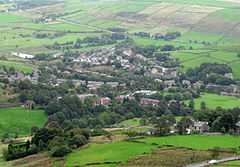Delph
| Delph | |
 A view of Delph |
|
 Delph |
|
| Population | 1,899 |
|---|---|
| OS grid reference | SD984080 |
| – London | 164 mi (264 km) SSE |
| Civil parish | Saddleworth |
| Metropolitan borough | Oldham |
| Metropolitan county | Greater Manchester |
| Region | North West |
| Country | England |
| Sovereign state | United Kingdom |
| Post town | OLDHAM |
| Postcode district | OL3 |
| Dialling code | 01457 |
| Police | Greater Manchester |
| Fire | Greater Manchester |
| Ambulance | North West |
| EU Parliament | North West England |
| UK Parliament | Oldham East and Saddleworth |
|
|
Coordinates: 53°34′08″N 2°01′24″W / 53.568814°N 2.023407°W
Delph (Old English (ge)delf a quarry) is a village in the Saddleworth civil parish of the Metropolitan Borough of Oldham, in Greater Manchester, England. Historically within the West Riding of Yorkshire, it lies amongst the Pennines on the River Tame below the village of Denshaw, 4.0 miles (6.4 km) east-northeast of Oldham, and 1.8 miles (2.9 km) north-northwest of Uppermill.
On Friday 7 April 1780 John Wesley visited the town and preached in a house owned by one of the trustees of the Independent Church.[1]
The centre of the village has barely changed from the 19th century, when a number of small textile mills provided employment for the local community.
The etymology of Delph is derived from the Old English word 'Delf', meaning a quarry and refers to the bakestone quarries which lay at the lower end of the Castleshaw Valley just north of the village. There is a significant first century AD Roman fort at Castleshaw.
Bakestones were quarried as tiles up to three quarters of an inch thick and used to bake oatcakes and muffins. The industry was in existence well before 1330 and only died out in 1930.
The village is home to one of the Saddleworth Whit Friday brass band contests, with in the region of seventy-five bands from across the UK and beyond marching down the main street at five minute intervals on the evening of the contest which often continues into the early hours. In the village of Dobcross a Henry Livings memorial prize is open to bands who play on any of the morning's walks on Whit Friday. It is also home to the Millgate Arts Centre, the home of the Saddleworth Players. This group of actors puts on six plays a year, as well as hosting a number of other events throughout the year.
The main street running through the centre of Delph was used in some of the external shots of the 2001 feature film The Parole Officer, starring Steve Coogan, Om Puri and Jenny Agutter. Delph was also used in the filming of the Whit Friday scene in the 1996 film Brassed Off. Delph is mentioned in the song This One's For Now by the band Half Man Half Biscuit on the 2014 album Urge For Offal.
Transport
The village has a turning circle round a small estate (Carrcote) which is used by all buses. The 82 and the X84 both run to Manchester Piccadilly on Monday to Friday peak times, these are rush hour times. The X84 by passes Oldham making the journey to Manchester quicker. The main service is the 350 which uses the same route as the 82 to Oldham and it also runs to Ashton-under-Lyne. This runs on a Monday to Saturday frequency of half an hour, and evening and Sunday frequency of an hour. The other routes are the 353 and the 354. These both terminate locally, at Carrcote and Denshaw, and also both run to Ashton, using similar routes. They both run on a Monday to Saturday frequency of every two hours, but both terminate at Uppermill at night times and Sundays. Finally, the 350 and 82 both exit Delph village by using the Carrcote estate then continuing their routes. Delph also has a small airport used for light craft and local airshows.
Delph railway station was opened in 1851 as part of the London and North Western Railway route from Oldham to Delph. The station closed in May 1955, when the Delph Donkey passenger train service to Delph via Greenfield was withdrawn.
References
- ↑ John Wesley. Journal. Friday 7 April 1780
External links
| ||||||